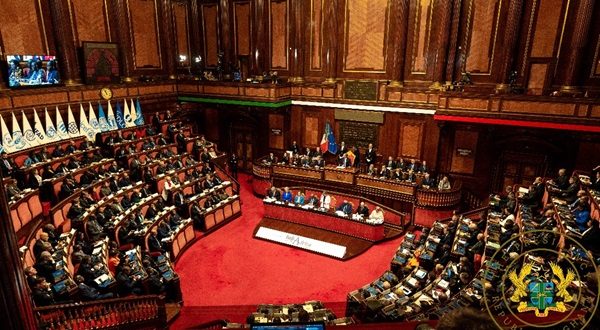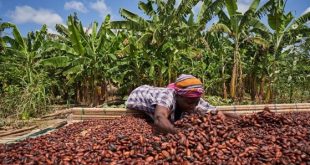The President of the Republic, Nana Addo Dankwa Akufo-Addo, has urged other Heads of State and the international business community to concentrate on releasing the potential income of 450 billion dollars from continental trade that is expected to result from the AfCFTA by 2035.
Additionally, President Akufo-Addo thinks that a one percent increase in Africa’s percentage of international trade, from two to three percent, could bring in an additional seventy billion dollars annually for the continent.
According to the President, a crucial first step toward accomplishing this is for everyone in the international community to back the demand for a new investment strategy that gives priority to partnerships between the private sectors of advanced economies and the economies of Africa.
Speaking at this year’s Africa-Italy summit on Monday, January 29, 2024, in Rome, Italy, President Akufo-Addo stated that it is critical to avoid “tax-dodging,” which refers to the illegitimate commercial transactions by multinationals that account for 60% of the US$88 billion in illicit financial flows from the continent each year, as well as other relationships that impede Africa’s development. This is in line with the urgency of taking the necessary steps towards resiliency as a continent.
Despite the fact that about 80% of African infrastructure projects fail at the feasibility and business planning stage, he made a positive observation, pointing out that, with the correct reforms and interventions, Africa could potentially unlock US$550 billion in infrastructure investments annually, according to an analysis done by the American management consulting firm Mckinsey & Company.
“Before 2020, Africa was attracting increasing foreign direct investment (FDI), although overall FDI inflows remained much lower than in other world regions. Between 2000 and 2019, FDI flows to Africa increased fourfold, with a compound annual growth rate of eight-point-five percent (8.5%). Our biggest challenge is not a scarcity of financing, but a confluence of poor governance, speculative risk perception, and a defective environment for crowding in investors.”
He was confident that with added emphasis placed on creating a de-risked landscape that innovatively crowds in resources from private sources of capital, international financial institutions, and sovereign wealth funds, governments on the continent will have to focus their efforts on delivering transformative investments like infrastructure to boost Africa’s development aspirations.
The African Development Bank says the continent’s infrastructure financing needs will be as much as $170 billion a year by 2025, with an estimated gap of around $100 billion a year.
This is essentially why, with a burgeoning population growing at a rate of 2.5% annually, “it has become even more urgent to provide reliable electricity, affordable and decent housing, improved transportation networks, and accessible health infrastructure.” he emphasised.
Touching on key efforts to engender the delivery of quality economic infrastructure for Africa’s post-COVID-19 recovery, he said, “recent happenings within the global space, particularly the COVID-19 pandemic, the Russian invasion of Ukraine, and the turmoil in the Middle East, which is threatening to engulf the rest of the world, have increased the need for policymakers on the African continent to achieve a structural transformation that yields inclusive and sustainable growth patterns over the medium to long term.”
Source: Ghanatodayonline.com
 Ghanatodayonline.com News, Politics, Health, Education & More
Ghanatodayonline.com News, Politics, Health, Education & More




